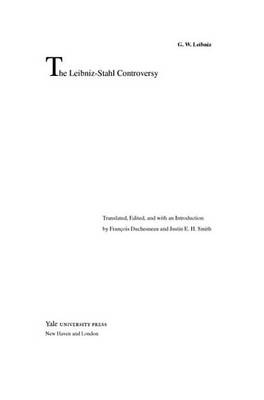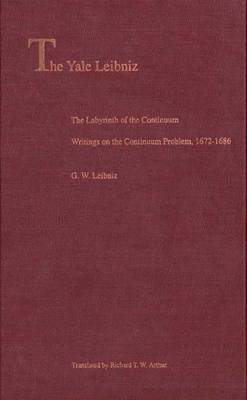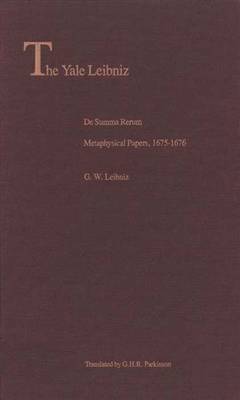The Yale Leibniz
8 total works
The correspondence between the eighteenth-century mathematician and philosopher G. W. Leibniz and G. E. Stahl, a chemist and physician at the court of King Friedrich Wilhelm I of Prussia, known as the Leibniz-Stahl Controversy, is one of the most important intellectual contributions on theoretical issues concerning pre-biological thinking. Editors Francois Duchesneau and Justin E. H. Smith offer readers the first fully annotated English translation of this fascinating exchange of philosophical views on divine action, the order of nature, causality and teleology, and the soul-body relationship.
Leibniz's texts (one in French, the rest in Latin) are presented with facing-page English translations, together with an introduction, notes, appendixes containing related excerpts from earlier works by Leibniz and his predecessors, and a valuable glossary detailing important terms and their translations.
In this book G. W. Leibniz presents not only his reflections on predestination and election but also a more detailed account of the problem of evil than is found in any of his other works apart from the Theodicy. Surprisingly, his Dissertation on Predestination and Grace has never before been published in any form. Michael J. Murray's project of translating, editing, and providing commentary for the volume will therefore attract great interest among scholars and students of Leibniz's philosophy and theology. Leibniz addresses such topics as free will, moral responsibility, divine causation, justice, punishment, divine foreknowledge, and human freedom, revealing crucial aspects of the genesis of his mature metaphysics and the theological motivations behind it.
This volume contains papers that represent Leibniz's early thoughts on the problem of evil, centering on a dialogue, the Confessio philosophi, in which he formulates a general account of God's relation to sin and evil that becomes a fixture in his thinking.
How can God be understood to be the ultimate cause, asks Leibniz, without God being considered as the author of sin, a conclusion incompatible with God's holiness?
Leibniz's attempts to justify the way of God to humans lead him to deep discussion of related topics: the nature of free choice, the problems of necessitarianism and fatalism, the nature of divine justice and holiness. All but one of the writings presented here are available in English for the first time.
The Leibniz-Arnauld Correspondence
by G. W. Leibniz, Antoine Arnauld, and Ernst, Landgrave of Hessen-Rheinfels
In this critical edition, Stephen Voss establishes the text of the magnificent Socratic correspondence between Gottfried Wilhelm Leibniz and Antoine Arnauld, provides an accurate English translation of the French text, and includes full apparatus helpful to student and scholar alike. The philosopher, physicist, and mathematician Leibniz presents the philosopher and theologian Arnauld with a unique new metaphysics and hones his ongoing thinking on the critical responses he receives. The result is a dialogue capable of illuminating metaphysical thought even now.
Brandon C. Look and Donald Rutherford present seventy-one of Leibniz's and Des Bosses's letters in the original Latin and in careful English translation. Few of the letters have been translated into English before. The editors also provide extensive annotations, deletions, and marginalia from Leibniz's various drafts, and a substantial introduction setting the context for the correspondence and analyzing the main philosophical issues.
This volume is a critical edition of the eight-year correspondence (1698-1706) between Gottfried Wilhelm Leibniz and Burcher de Volder, professor of philosophy and mathematics at Leiden University.
Containing the surviving correspondence between Leibniz and De Volder, the volume also presents a generous selection from the letters between Leibniz and his friend Johann Bernoulli, through whose intercession the correspondence began. Bernoulli acted as intermediary throughout, and the often candid discussions between Leibniz and Bernoulli provide illuminating background to the correspondence proper. Each of the selections appears both in the original Latin and in English translation.




